Ammonia for strawberries
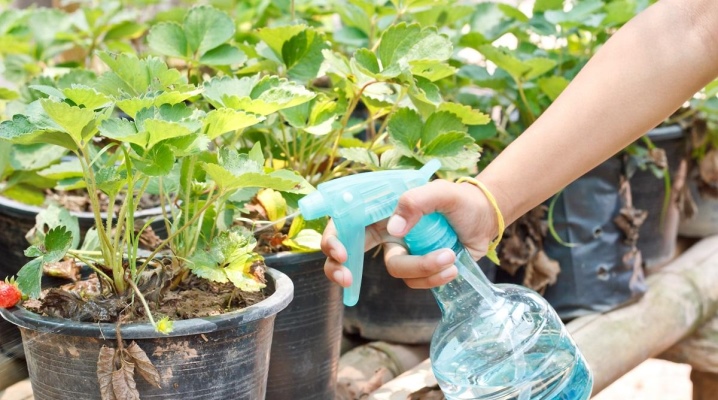
Some substances used by gardeners in the course of their professional activities may have several effects at once. They play the role of fertilizers, and also provide reliable protection against various pests. For many years, ammonia has been actively used to fertilize strawberries, while showing its effectiveness and reliability.
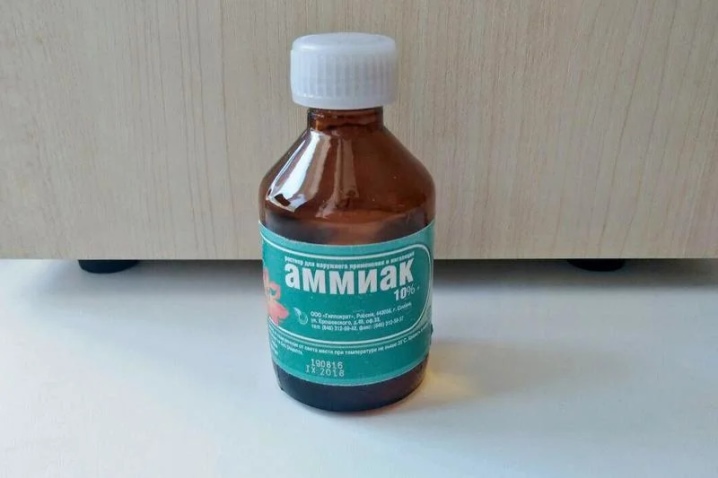
Advantages and disadvantages
Ammonia is a combination of ammonia and nitrogen compounds. A distinctive feature of these elements is that they are extremely necessary for the plant world and any organism as a whole. The unique combination allows for a high level of efficiency in use. It should be noted that this substance cannot be used in its pure form, therefore, it will be necessary to create its solution, exactly following the proportions. Otherwise, you can not only not see the effect of the application, but also cause irreparable harm to the strawberries.
Ammonia contains 80% nitrogen, therefore it is considered one of the most optimal means for feeding strawberries. It is due to its unique composition that this substance is actively used as a nitrogen fertilizer.
In addition, the element has a special structure, which allows it to quickly find itself in tissues and be absorbed in them, and this has a positive effect on the state of strawberries and prevents nitrates from forming in it, which are harmful substances.
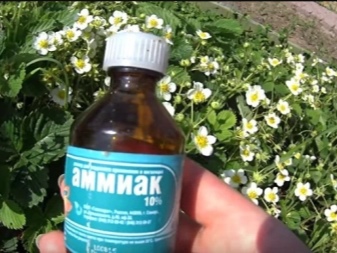
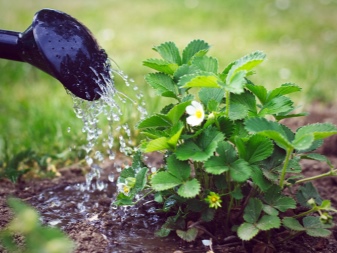
Among the main advantages of using this product are the following.
- The use of ammonia is allowed in any vegetative period, which greatly simplifies the process of use. The substance will show itself perfectly both in early spring and during harvest, since it does not contain toxic elements.
- The use of ammonia for feeding strawberries will be an excellent solution on acidic soil, since in this case the substance will play the role of alkali.
- The product is absolutely safe, which allows it to process even plants with ripe berries. This favorably distinguishes the product against the background of pesticides, which are prohibited to use during this period. The fruits are allowed to be eaten immediately after harvest. To do this, simply rinse them out.
- The substance shows itself perfectly in the fight against both bacterial and fungal diseases. In addition, it is considered an ideal solution against a variety of pests that can attack strawberries.
- Ammonia is very cheap and can be bought at any pharmacy.
- An ammonia solution, when used correctly, leads to rapid foliage growth, which has a positive effect on the yield.
- The solution can also be used as a preventive measure to protect the crop from various pests. This treatment almost completely protects strawberries from ants and beetles.
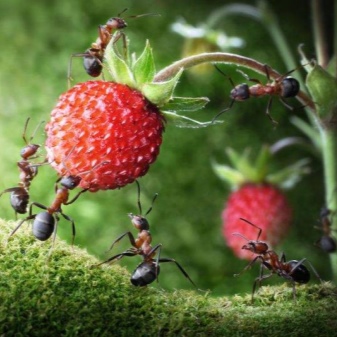
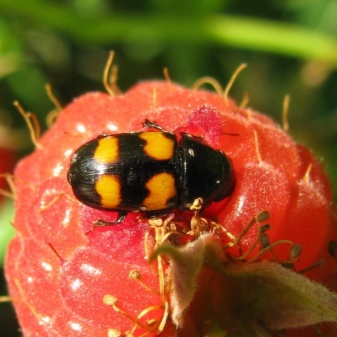
The only drawback of ammonia is that after harvesting the food may smell like a substance, but this problem is quickly solved by rinsing the strawberries with copious amounts of water.
How to breed ammonia?
In order for the tool to be as effective as possible and not harm the culture, it is necessary to pay close attention to its breeding. It should be noted that the proportions during the preparation of the solution may differ depending on when exactly the product is used.
If the treatment takes place in early spring, then 1000 ml of water should be added to 40 ml of liquid with 10% composition. The resulting solution will be an excellent solution for protecting strawberries from pests, feeding, as well as for other purposes.
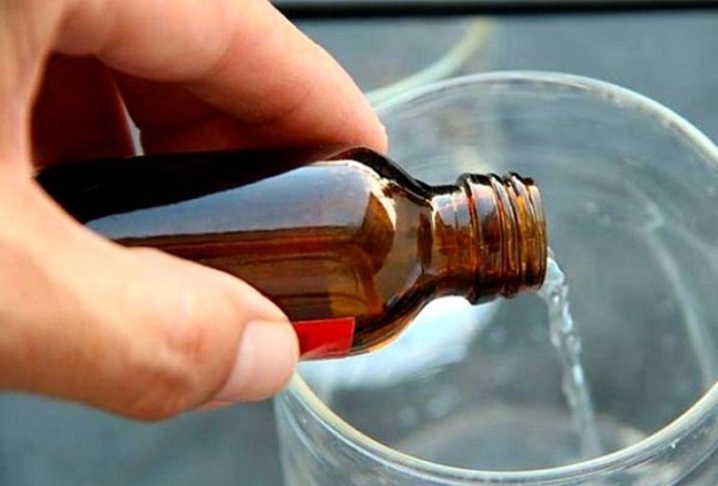
The cooking process is as follows:
- 100 grams of laundry soap should be grated, then dissolve all this by pouring a liter of boiling water;
- add a little cold water and stir to make the liquid as homogeneous as possible;
- a little ammonia is added to the bucket in an optimal proportion.
After preparation, the solution is applied immediately. If the strawberry is already in bloom, then it will be necessary to slightly revise the concentration. For 10 liters of liquid, you should take about 30 ml of alcohol. After picking the berries, you should use the same solution as in the spring. A few drops of iodine can be added for maximum effectiveness.
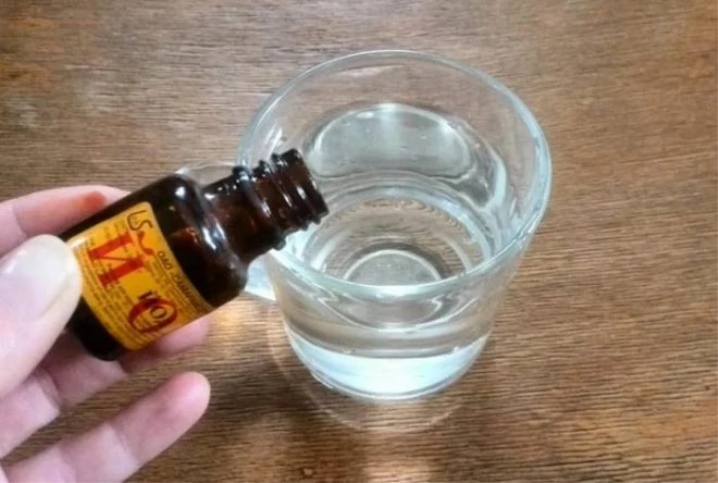
Application
For ammonia to be as effective as possible, it must be used correctly. It is necessary to strictly follow the rules of processing and feeding.
Top dressing
One of the most effective and proven feeding methods is watering strawberries three times. The first time processing is carried out at the very beginning of the season, when leaves appear on the plant. For such a case, the usual portion of ammonia will suffice. During watering, it is imperative to water the aerial parts of the strawberries, as well as the roots. This will provide reliable protection of the plant from the negative effects of fungal diseases and the formation of nematodes.
As for the second treatment, it is usually carried out in minimal proportions. It will be enough to add 25 drops per 10 liters of liquid. You need to feed the strawberries after they have bloomed to give them strength for ripening. For the third time, feeding is carried out after the harvest has been harvested. Professional gardeners advise using a medium strength spring solution. Thanks to this, the plots that have undergone treatment will go for the winter and will be able to wake up already full of strength for a new harvest.
This not only makes it possible to increase the survival rate of the plant, but also provides a high level of income.
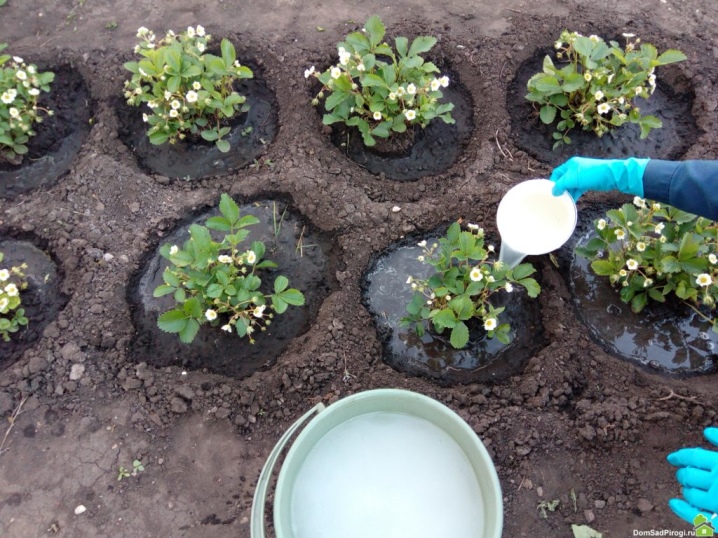
If strawberries have been grown for several years and there is a suspicion that the earth is very tired, then you can use one more extremely useful advice. When using ammonia solution, you can add a small amount of iodine solution. Five drops is enough to greatly enhance the results of disinfection, as well as provide the plant with the necessary amount of minerals and trace elements. Fertilize the soil with solutions of low concentration.
There is also a secret to using ammonia to accelerate the ripening of strawberries. If the cold weather will soon go, and there are a large number of unripe berries on the bushes, then you can speed up this process by simply sprinkling the plant with the prepared solution. To do this, you need to mix shampoo for children, a couple of tablespoons of ammonia, and apple cider vinegar with a bucket of plain water. If you process strawberries with such a solution, then it will be possible to significantly accelerate their ripening and get the opportunity to harvest before the frost sets in.
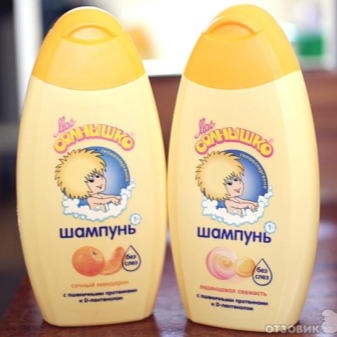
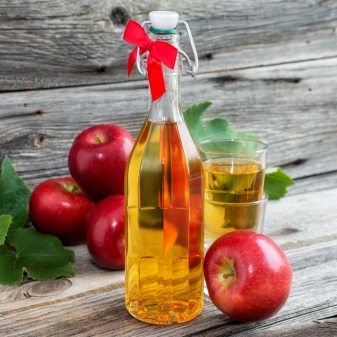
Pest control
Despite all the efforts and competent care, strawberries are still attacked by various pests. The use of an ammonia solution makes it possible to achieve high efficiency in the fight against almost all garden pests, and the pungent smell frightens off even large predators.
Here are the most common ways to fight.
- Add 2 ml of ammonia to a bucket of liquid. In addition, laundry soap or some kind of dishwashing detergent is often added here, due to which it is possible to provide excellent adhesion to the leaves of the plant.Seedling processing should be carried out as needed. The ideal time for this is early morning. Soap solution with ammonia allows you to drive away many "enemies".
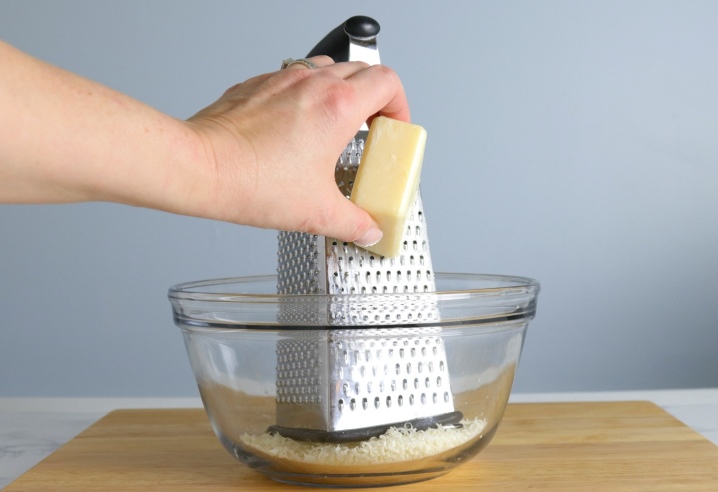
- Ants, of course, they do not pose a direct threat to strawberries., but they contribute to the appearance of aphids or they can erect large anthills right near the root. To get rid of them on the site, it is enough to prepare a solution of ammonia with a medium concentration and spray the area with it. To do this, you need to dilute 20 ml of alcohol in a liter of water, and then pour the composition into the ant passages. This method is also actively used to get rid of ants in the house.
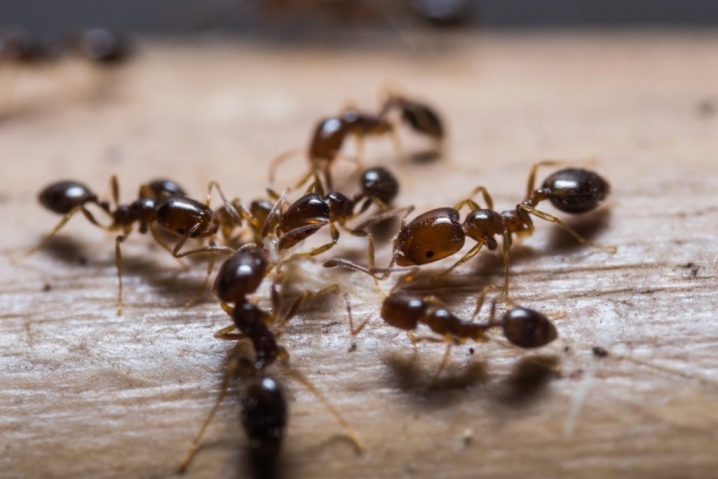
- In the fight against weevils, ammonia also shows itself perfectly. It will be enough to dilute 5 ml of alcohol in a bucket of water and add a couple of drops of iodine and a little soda there. The result is a solution that needs to be treated with strawberries once a week until the problem is completely eliminated.
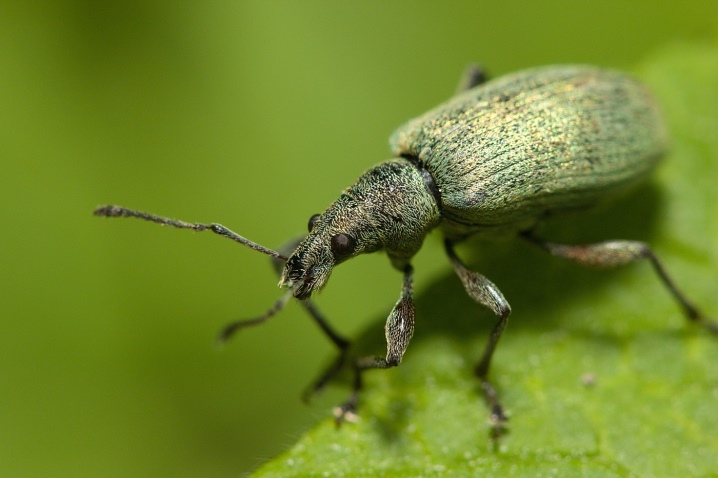
- Often, strawberries become an object of attack by moles. If you want to make the pest leave the site and no longer bother you, it will be enough to dig its hole, and then put some cotton wool dipped in ammonia inside. If there is a desire to enhance the effect, then you can close the hole with slate or some kind of board. In a couple of hours, the moles will disappear from the site and never return.
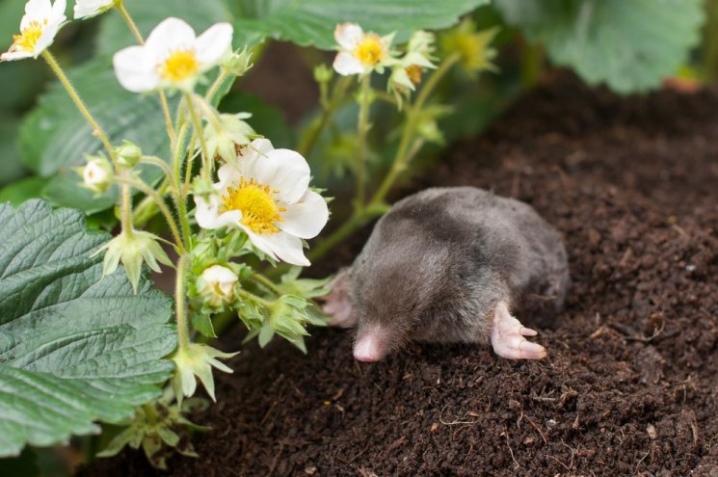
Useful Tips
Ammonia has a rather pungent and strong odor that can cause discomfort. In order to prevent this and ensure maximum efficiency from the application, it is worth paying attention to some processing rules.
- The proportions should be observed as accurately as possible.
- In the process of work, it is imperative to use protective equipment: gloves and glasses.
- The solution is best prepared outdoors. If the plants are being processed inside the greenhouse, then the room should be well ventilated after that.
- It is recommended to spread the product around the garden using sprayers. Some treat plants with a broom or brush, but this can cause the plant to be too saturated with active substances.
- Calm weather is considered the ideal time for processing, and the procedure is carried out after watering.
- If a solution of ammonia is used as a prophylaxis, then a garden watering can also be used for these purposes.
- If ammonia gets on the mucous membranes, immediately rinse them with copious amounts of running water. If there are any signs of intoxication, then you should immediately consult a doctor.
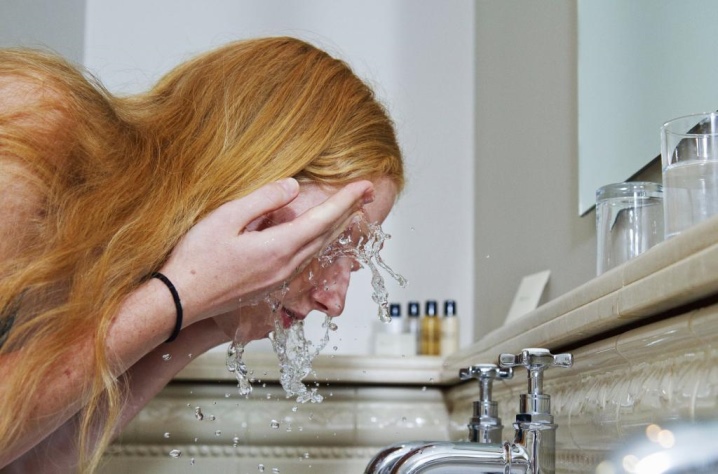
Thus, ammonia is an excellent remedy for protecting strawberries from most diseases and pests. With the help of this solution, you can get rid of slugs, moles, May beetle larvae, ants, and prevent the appearance of fungal and bacterial diseases. Such an ammonia solution is good because it can be sprayed during flowering, fruiting, or even after picking strawberries.
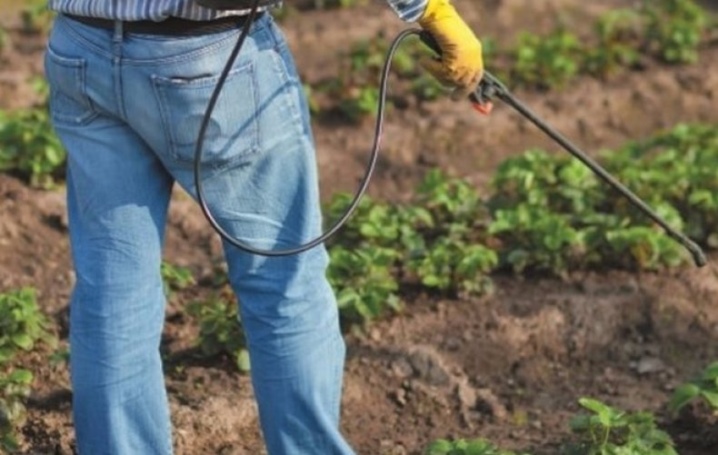













The comment was sent successfully.